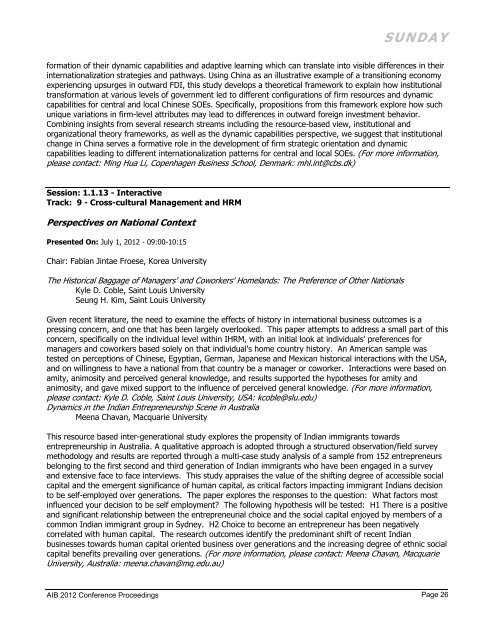AIB 2012 Conference Proceedings - Academy of International ...
AIB 2012 Conference Proceedings - Academy of International ...
AIB 2012 Conference Proceedings - Academy of International ...
Create successful ePaper yourself
Turn your PDF publications into a flip-book with our unique Google optimized e-Paper software.
SUNDAY<br />
formation <strong>of</strong> their dynamic capabilities and adaptive learning which can translate into visible differences in their<br />
internationalization strategies and pathways. Using China as an illustrative example <strong>of</strong> a transitioning economy<br />
experiencing upsurges in outward FDI, this study develops a theoretical framework to explain how institutional<br />
transformation at various levels <strong>of</strong> government led to different configurations <strong>of</strong> firm resources and dynamic<br />
capabilities for central and local Chinese SOEs. Specifically, propositions from this framework explore how such<br />
unique variations in firm-level attributes may lead to differences in outward foreign investment behavior.<br />
Combining insights from several research streams including the resource-based view, institutional and<br />
organizational theory frameworks, as well as the dynamic capabilities perspective, we suggest that institutional<br />
change in China serves a formative role in the development <strong>of</strong> firm strategic orientation and dynamic<br />
capabilities leading to different internationalization patterns for central and local SOEs. (For more information,<br />
please contact: Ming Hua Li, Copenhagen Business School, Denmark: mhl.int@cbs.dk)<br />
Session: 1.1.13 - Interactive<br />
Track: 9 - Cross-cultural Management and HRM<br />
Perspectives on National Context<br />
Presented On: July 1, <strong>2012</strong> - 09:00-10:15<br />
Chair: Fabian Jintae Froese, Korea University<br />
The Historical Baggage <strong>of</strong> Managers' and Coworkers' Homelands: The Preference <strong>of</strong> Other Nationals<br />
Kyle D. Coble, Saint Louis University<br />
Seung H. Kim, Saint Louis University<br />
Given recent literature, the need to examine the effects <strong>of</strong> history in international business outcomes is a<br />
pressing concern, and one that has been largely overlooked. This paper attempts to address a small part <strong>of</strong> this<br />
concern, specifically on the individual level within IHRM, with an initial look at individuals' preferences for<br />
managers and coworkers based solely on that individual's home country history. An American sample was<br />
tested on perceptions <strong>of</strong> Chinese, Egyptian, German, Japanese and Mexican historical interactions with the USA,<br />
and on willingness to have a national from that country be a manager or coworker. Interactions were based on<br />
amity, animosity and perceived general knowledge, and results supported the hypotheses for amity and<br />
animosity, and gave mixed support to the influence <strong>of</strong> perceived general knowledge. (For more information,<br />
please contact: Kyle D. Coble, Saint Louis University, USA: kcoble@slu.edu)<br />
Dynamics in the Indian Entrepreneurship Scene in Australia<br />
Meena Chavan, Macquarie University<br />
This resource based inter-generational study explores the propensity <strong>of</strong> Indian immigrants towards<br />
entrepreneurship in Australia. A qualitative approach is adopted through a structured observation/field survey<br />
methodology and results are reported through a multi-case study analysis <strong>of</strong> a sample from 152 entrepreneurs<br />
belonging to the first second and third generation <strong>of</strong> Indian immigrants who have been engaged in a survey<br />
and extensive face to face interviews. This study appraises the value <strong>of</strong> the shifting degree <strong>of</strong> accessible social<br />
capital and the emergent significance <strong>of</strong> human capital, as critical factors impacting immigrant Indians decision<br />
to be self-employed over generations. The paper explores the responses to the question: What factors most<br />
influenced your decision to be self employment The following hypothesis will be tested: H1 There is a positive<br />
and significant relationship between the entrepreneurial choice and the social capital enjoyed by members <strong>of</strong> a<br />
common Indian immigrant group in Sydney. H2 Choice to become an entrepreneur has been negatively<br />
correlated with human capital. The research outcomes identify the predominant shift <strong>of</strong> recent Indian<br />
businesses towards human capital oriented business over generations and the increasing degree <strong>of</strong> ethnic social<br />
capital benefits prevailing over generations. (For more information, please contact: Meena Chavan, Macquarie<br />
University, Australia: meena.chavan@mq.edu.au)<br />
<strong>AIB</strong> <strong>2012</strong> <strong>Conference</strong> <strong>Proceedings</strong><br />
Page 26

















